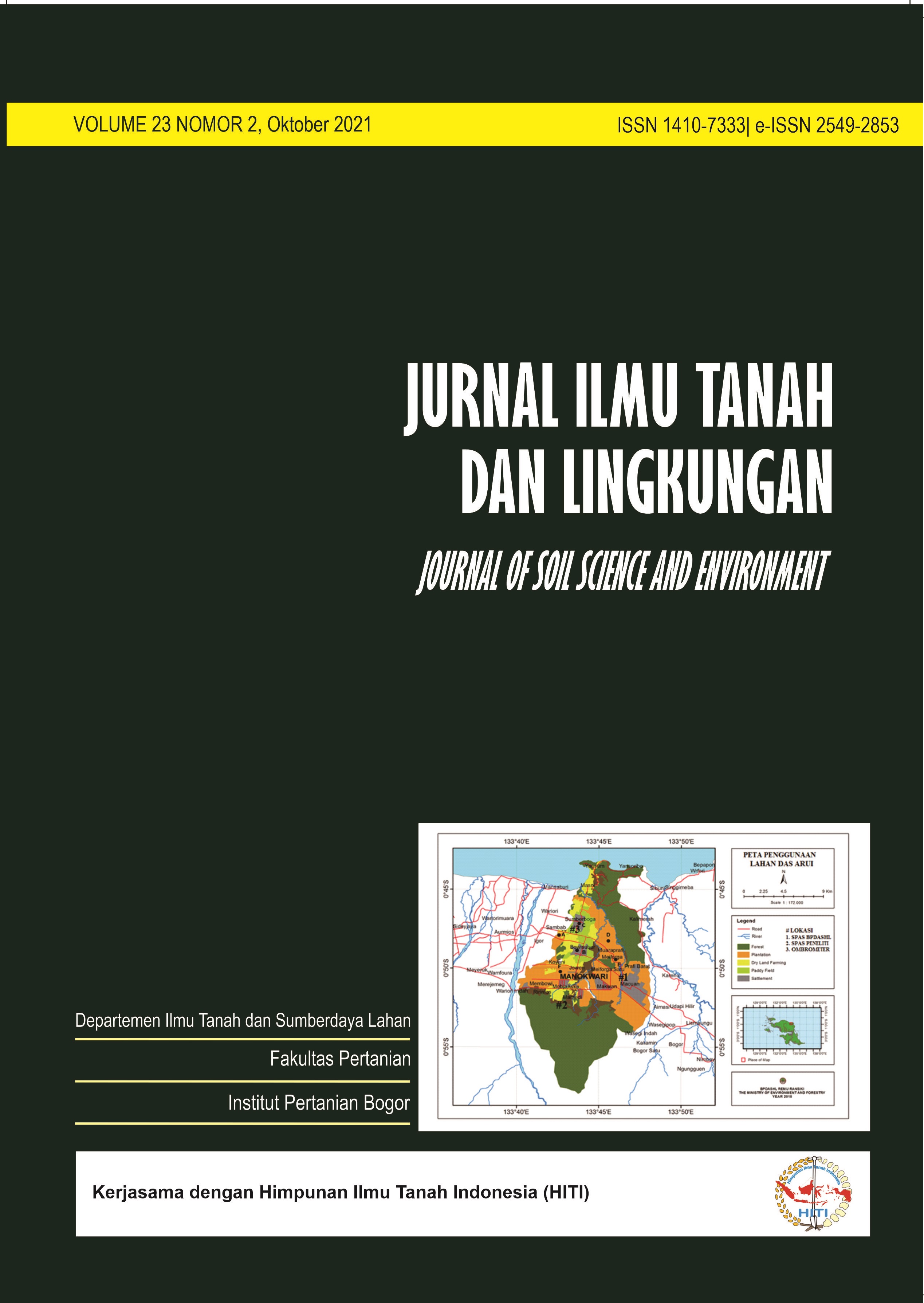Dynamics of Nitrogen Release by Four Types of Urea in Flooded Conditions
Dinamika Pelepasan Nitrogen Empat Jenis Pupuk Urea Pada Kondisi Tanah Tergenang
Abstract
Urea fertilizer is the most widely used source of nitrogen (N) in Indonesia, including in paddy fields. Urea is a water-soluble N fertilizer, so the use of urea in paddy fields needs to be studied in relation to the release of fertilizer. In this study, urea with different formulations was used those were urea Kujang and Pusri as conventional urea, while urea prill and granule as modified urea containing 0.10 and 0.50% formaldehyde, respectively. The method in this study was the incubation and washing method. Incubation was carried out for 7, 14, 28, 45, 60, and 90 days and washing was conducted at the end of each incubation period. The results of washing were determined for the content of ammonium and nitrate. The results showed that the release of N in the form of ammonium and nitrate among urea fertilizer types were not significantly different. The results of total leached N showed that the highest value was obtained by granule urea at 78.0 mg tube-1, then followed by prill urea at 75.2 mg tube-1, Kujang urea at 71.5 mg tube-1, and Pusri urea at 68.4 mg tube-1. Based on the results of the first-order kinetic equation, The maximum release and constant rate were revealed. The highest value of maximum release was obtained by granule urea at 94.6 mg tube-1, then followed by prill urea at 88.3 mg tube-1, Pusri urea at 82.3 mg tube-1, and Kujang urea at 79.2 was mg tube-1. As for the rate constant the highest value of rate constant was obtained by urea Kujang at 0.0349 day-1, followed by prill urea and Pusri urea at 0.0256 day-1, and granule urea at 0.0253 day-1. The result suggested that urea treated with formaldehyde especially in the form of granule tended to slow down the release of N indicated by the lowest value of the rate constant of N released.
Downloads
References
Benedetti, A. and G. Sebastiani. 1993. Determination of potentially mineralizable nitrogen in agriculture soil. Biol. Fertil. Soil, 21: 114-120.
Dou, Z., J.D. Toth, J.D. Jabro, R.H. Fox, and D.D. Fritton. 1996. Soil nitrogen mineralization during laboratory incubation: Dynamics and model fitting. Soil Biol. Biochem., 28(4–5): 625–632.
Fikri, U., Marsudi, dan D.R. Jati. 2014. Pengaruh penggunaan pupuk terhadap kualitas air tanah di lahan pertanian kawasan rawa Rasau Jaya 3, Kab. Kubu Raya. Jurnal Teknologi Lingkungan Lahan Basah, 2(1): 1-10.
Haq, M.A., S. Triwiningsih dan Suherman. 2012. Pembuatan urea pelepasan lepas lambat melalui pelapisan dengan amilum-acrylic menggunakan teknologi fluidized bed spray. Jurnal Teknologi Kimia dan Industri, 1(1): 229-236.
Hardjowigeno, S. 2003. Ilmu Tanah. Akademika Pressindo. Jakarta.
Hartono, A., L.T. Indriyati, P.T. Santari dan N.E. Novianti. 2019. Perubahan sifat kimia dan pola pelepasan amonium dan nitrat pada Ultisol Darmaga yang diberi pupuk pelet berbahan dasar lumpur kolam ikan. J. Il. Tan. Lingk., 21(2): 78-86.
Indriyati, L.T., S. Sabiham, L.K. Kadarusman, T. Situmorang, Sudarsono dan W.H. Sisworo. 2008. Transformasi nitrogen dalam tanah tergenang: aplikasi jerami padi dan kompos jerami padi. Jurnal Tanah Tropika, 13(3): 189-197.
Leiwakabessy, F.M. 1988. Kesuburan Tanah. Departemen Tanah, Fakultas Pertanian, IPB. Bogor.
Lestari, R.S., D. Rochmadi dan Supranto. 2013. Pelepasan lambat (slow release) diazinon dari mikrokapsul melamin urea formaldehida. Jurnal Rekayasa Proses, 7(2): 31-36.
Mawaddah, A., Roto dan A. Suratman. 2016. Pengaruh penambahan urea terhadap peningkatan pencemaran nitrit dan nitrat dalam tanah. Jurnal Manusia dan Lingkungan, 23(3): 360-364.
Mukaromah, L., T. Nurhidayati dan S. Nurfadilah. 2013. Pengaruh sumber dan konsentrasi nitrogen terhadap pertumbuhan dan perkembangan biji Dendrobium laxiflorum J.J Smith secara in vitro. Jurnal Sains dan Seni POMITS, 2(1): 26-29.
Mulyani, N.S., M.E. Suryadi, S. Dwiningsih dan Haryanto. 2001. Dinamika hara nitrogen pada tanah sawah. Jurnal Tanah dan Iklim, 19: 14-25.
Prasad, R. and S.K. De Datta. 1979. Increasing fertilizer nitrogen efficiency in wetland rice. In International Rice Research Institute Nitrogen and Rice. Los Baños, Laguna, Philippines. p. 465-484.
Salthammer, T. dan J. Gunschera. 2021. Release of formaldehyde and other organic compounds from nitrogen fertilizer. Journal of Chemosphere, 263: 1-8.
Shaviv, A. 2000. Advances in controlled release fertilizer. Advances in Agronomy, 71:1-49.
Sholikah, M.H., Suyono dan P.R. Wikandari. 2013. Efektivitas kandungan unsur hara N pada pupuk kandang hasil fermentasi kotoran ayam terhadap pertumbuhan tanaman terung (Solanum Melongena L.). Journal of Chemistry, 2(1):131-136.
Situmorang, R. dan U. Sudadi. 2001. Tanah Sawah. Jurusan Tanah. Fakultas Pertanian. Institut Pertanian Bogor. 105 hal.
Soepardi, G. 1983. Sifat dan Ciri Tanah. IPB Press. Bogor.
Stanford, G. and S.J. Smith. 1972. Nitrogen mineralization potentials of soils. Soil Sci.Soc.Am.Proc., 36: 465-472.
Suparto, H. 2018. Kehilangan nitrogen pada sistem usahatani jagung manis di lahan gambut kalimantan tengah. Jurnal Agripeat, 19 (1): 51-58.
Yamamoto, C.F., E.I. Pereira, L.H.C. Mattoso, T. Matsunaka and C. Ribeiro. 2016. Slow release fertilizer based on urea/urea-formaldehyde polymer nanocomposites. Chemical Engineering Journal, 287: 390-397.
Zhang, J., P. He, W. Ding, S. Ullah, T. Abbas, M. Li, C. Ai and W. Zhou . 2021. Identifying the critical nitrogen fertilizer rate for optimum yield and minimum nitrate leaching in a typical field radish cropping system in china. Journal of Environmental Pollution, 268: 1-10.
Department of Soil Science and Land Resources Departemen Ilmu Tanah dan Sumberdaya Lahan, Faculty of Agriculture Fakultas Pertanian, IPB University



















